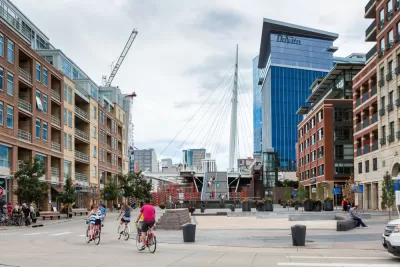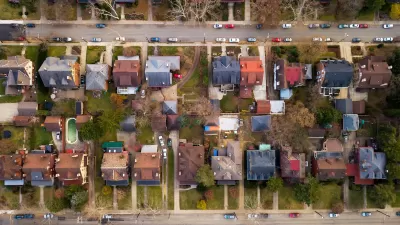As states move to boost housing production near transit, opposition from neighborhood groups frustrates efforts to build new developments.

Despite state-level efforts to encourage transit-oriented development, reports Jared Brey, TOD projects often meet with resistance at the local level, often from single-family neighborhoods that fear the purported negative impacts of increased density. Brey describes some successful and failed initiatives from around the country.
Despite California's extreme housing shortage, state efforts to mandate transit-oriented density have failed to produce significant results. However, a Los Angeles program that incentivizes transit-oriented affordable housing has become popular with developers seeking new construction permits. Meanwhile, in Atlanta, one recent proposal to eliminate parking requirements and allow denser housing development and multifamily housing near transit was rejected by a city council committee due to resident concerns.
Because transit-oriented development can result in higher housing costs and displacement, as evidenced in a report from the city of Chicago that evaluated the results of the city's 2013 TOD ordinance, that city has published an "equitable transit-oriented policy plan" meant to address this issue and ensure equitable access to the benefits of transit-oriented development.
While there is no empirical evidence showing negative economic impacts on communities or home values surrounding TOD, hostility remains strong. Housing advocates say that dispelling myths about multifamily housing and density can help reduce local opposition and help communities imagine a more affordable, more walkable future.
FULL STORY: The Difficult Push to Build More Housing Near Transit

Planetizen Federal Action Tracker
A weekly monitor of how Trump’s orders and actions are impacting planners and planning in America.

Map: Where Senate Republicans Want to Sell Your Public Lands
For public land advocates, the Senate Republicans’ proposal to sell millions of acres of public land in the West is “the biggest fight of their careers.”

Restaurant Patios Were a Pandemic Win — Why Were They so Hard to Keep?
Social distancing requirements and changes in travel patterns prompted cities to pilot new uses for street and sidewalk space. Then it got complicated.

Platform Pilsner: Vancouver Transit Agency Releases... a Beer?
TransLink will receive a portion of every sale of the four-pack.

Toronto Weighs Cheaper Transit, Parking Hikes for Major Events
Special event rates would take effect during large festivals, sports games and concerts to ‘discourage driving, manage congestion and free up space for transit.”

Berlin to Consider Car-Free Zone Larger Than Manhattan
The area bound by the 22-mile Ringbahn would still allow 12 uses of a private automobile per year per person, and several other exemptions.
Urban Design for Planners 1: Software Tools
This six-course series explores essential urban design concepts using open source software and equips planners with the tools they need to participate fully in the urban design process.
Planning for Universal Design
Learn the tools for implementing Universal Design in planning regulations.
Heyer Gruel & Associates PA
JM Goldson LLC
Custer County Colorado
City of Camden Redevelopment Agency
City of Astoria
Transportation Research & Education Center (TREC) at Portland State University
Camden Redevelopment Agency
City of Claremont
Municipality of Princeton (NJ)





























